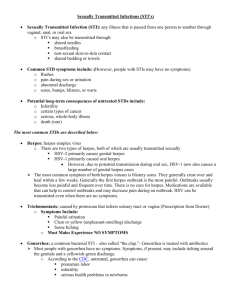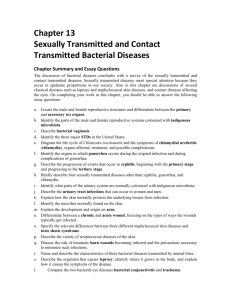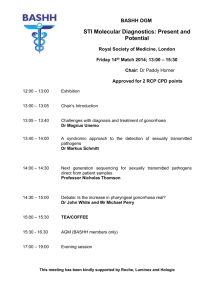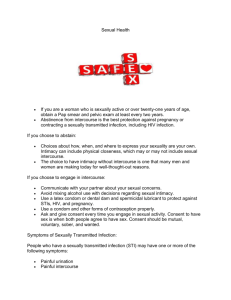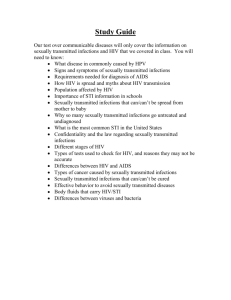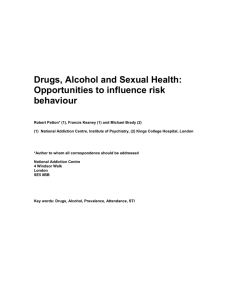Let's Talk about SEX
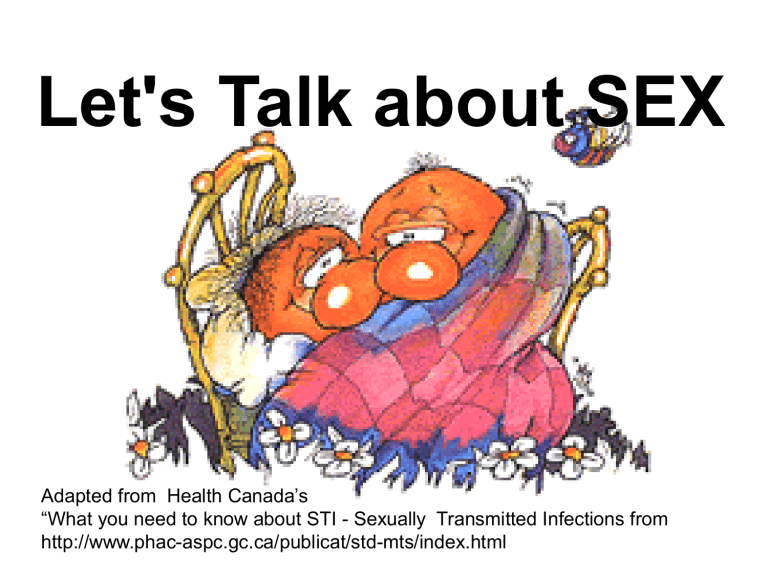
Let's Talk about SEX
Adapted from Health Canada’s
“What you need to know about STI - Sexually Transmitted Infections from http://www.phac-aspc.gc.ca/publicat/std-mts/index.html
Sex is a normal and healthy part of our lives
• Today, there are many types of infections that are spread through sex. These infections are called sexually transmitted infections or STI.
• Some are easily cured. Some infections have no cure.
There are many kinds of sexually transmitted infections, and they can seriously affect your health.
• You should know about sexually transmitted infections because they can affect your ability to have children later in life. Some can also cause cancer. AIDS is fatal.
• In Canada, the highest rates and increases in STIs are in young people ages 15 to 24.
• If you are having sex, or thinking about having sex, you need to know how to avoid sexually transmitted infections
(also called sexually transmitted diseases or STD).
How to know if you have an infection?
How to know if you have an infection?
Some people with an STI have few or no symptoms at all ; others have very obvious symptoms. Be aware of any changes in your health, or symptoms such as:
• different or heavier discharge from the vagina
• discharge from the penis
• a burning feeling when urinating (peeing)
• sores, particularly in the genital or anal areas
• itchy feeling around the sex organs or anus
• appearance of a rash
• swollen glands in the groin.
These symptoms might appear alone, or in combination.
Having a symptom doesn't mean you do have an STI but if you are having sex and taking chances, you should see a health professional for a check-up.
What are my chances of catching an STI?
You can get an STI from having sex with someone who is infected regardless of age, background, or sexual orientation.
You have a chance of catching a sexually transmitted infection if:
• you have unprotected oral, vaginal or anal sex (without using a condom or if the condom breaks) with a person who may have an infection
• your partner has, or has had, a sexually transmitted infection
• you have a new sex partner
• you or your partner had or is having sex with others
• you have sex under the influence of alcohol or drugs
• you share needles or equipment for drugs, body piercing, tattoos, or sex toys or your partner does.
• If you have taken chances such as having sex without using a condom , please see a doctor or visit a public health clinic, and ask for an STI checkup. Your health is important, and so is the health of your partner. Remember that some STIs may not cause symptoms.
No STI for me!
The only sure way to prevent a sexually transmitted infection is to avoid risky behaviour.
Healthy and safer choices:
• abstinence
• consider doing other things with your partner, like kissing, caressing and touching, instead of having intercourse
• use a condom every time - it's the most important thing you can do
• ask yourself, how many partners have I had this year? Am I taking chances?
• IT TAKES TWO! The birth control pill prevents pregnancy, and the condom helps to prevent STI.
• the riskiest way of having sex in terms of catching an STI is anal sex
(for both males and females) - but you can get an STI from vaginal and oral sex as well
• never share needles or equipment for drugs, tattoos or body piercing
• If you think you might have a sexually transmitted infection, please see your doctor or go to a clinic. All the information you give will be kept private.
How are STIs spread?
• STIs or sexually transmitted infections can be spread in several ways.
• STIs are usually spread through sex because the bacteria or viruses travel in semen, vaginal fluids, and blood. Saliva (or spit) can spread some STIs if you have a tiny cut in or around your mouth.
• STIs can be spread through direct contact with an infected area.
• Infected blood on needles and syringes can spread certain STIs.
• Infected women can pass some STIs to their babies during pregnancy, at childbirth or during breastfeeding.
• You can catch some STIs more than once. And, you can have more than one STI at a time.
• If you are HIV positive and have another of the sexually transmitted infections, you increase your chances of GIVING HIV to your partner.
• If you don't have HIV but have another sexually transmitted infection, you increase your chances of GETTING HIV from an HIV positive partner.
• Many STIs are easily treated, but all can be dangerous if ignored.
• To reduce the possibility of spreading STIs or reinfection, sexually activity should be postponed until treatment has been completed.
• For some STIs, like HIV, there is no cure to date.
Chlamydia
• Chlamydia (pronounced kla-mid-ee-ah) is a very common bacterial sexually transmitted infection - and one of the more serious.
• It can spread silently in females and cause a painful, long-term condition called PID (pelvic inflammatory disease) and infertility (the inability to have children). Pregnant women can pass this infection on to their babies at birth, who can then get infections of their eyes or lungs.
• You can get chlamydia from oral, vaginal or anal sex.
• A woman may never know she is infected with chlamydia until she has a test for it or decides to have a baby and has problems trying to become pregnant.
• For those who develop symptoms, they usually appear two to six weeks after sex with an infected person. Sometimes, the symptoms are so mild that a person may not notice them. Men often have no symptoms and can spread the infection without knowing they have it.
It is very important that chlamydia be treated right away.
What to look for: Chylmydia
• Females:
• a new or different discharge from the vagina
• a burning feeling when urinating
• pain in the lower abdomen, sometimes
• with fever and chills
• pain during sex
• vaginal bleeding between periods
• vaginal bleeding after intercourse
• Males:
• a watery or milky drip from the penis
• an itchy feeling inside the penis
• a burning feeling when urinating
• pain or swelling in the testicles
• A quick and reliable urine test is available for chlamydia for both men and women.
• If you are having sex and have taken chances, see a health professional or go to a clinic and ask to be tested.
How chlamydia is treated?
• Chlamydia can often be treated with just one dose of antibiotics taken by mouth. But you can get it again right away from your partner if he/she isn't treated as well.
• You must get a prescription for the right antibiotic from your doctor.
Don't borrow medicine from your friends, and you cannot buy the medicine on the street.
• Treatment is important
• Your doctor or nurse may ask you for the name of your partner or ask you to tell your partner so that this STI will not be spread further. Make sure you take your medication until it is finished. Ask your doctor or nurse how soon after treatment you can have sexual intercourse.
• If you are a female with chlamydia and you don't get treated, this could happen to you:
• you might develop a pain in your abdomen or belly that never seems to go away
• the infection could spread to all your reproductive organs and cause PID
• you may have problems later in life getting pregnant or during your pregnancy.
• The long-term effects of chlamydia on males are not well known.
Gonorrhea
• You may have heard of this STI by other names such as "the clap" or "a dose." Gonorrhea is a common STI which, if not treated early, can cause serious health problems, especially for women.
• Gonorrhea in women left untreated could lead to a painful, long-term condition called PID (pelvic inflammatory disease) and infertility (the inability to have children).
• A pregnant woman can pass gonorrhea to her baby during birth, and cause a serious eye infection or blindness.
• You can get gonorrhea from oral, vaginal and anal sex.
• The symptoms and signs
•If you catch gonorrhea from having sex with an infected partner, you might not notice any symptoms. If you do, they will appear three to five days after sex.
•Even if you don't have symptoms, you can have gonorrhea and you can pass it on to others.
What to look for: Gonorrhea
Females:
• new or different discharge from the vagina
• a burning feeling when urinating
• pain in the lower abdomen
• fever and chills
• pain during sex
• vaginal bleeding between periods
• vaginal bleeding after intercourse
• possible rectal pain
• rectal discharge
Males:
• discharge from the penis, may be thick and yellow-green in colour
• burning feeling when urinating
• pain or swelling in the testicles
• possible rectal pain
• rectal discharge
To test for gonorrhea, a swab of the area is usually taken or a new urine test may be used.
How gonorrhea is treated?
• Gonorrhea can often be treated with just one dose of antibiotics taken by mouth and can be cured. But you can get it again right away from your partner if he/she isn't treated as well. See a doctor or go to a clinic and, if you have gonorrhea, tell your partner
So put one on
Where to go for help
• If you are sexually active and have been taking chances, please see a doctor, or go to a free clinic to make sure you don't have an STI. You owe it to yourself, your partner and your future.
• And remember, all the information you give is always kept private.
• To find a clinic, check your telephone book under
“Sexual Health” in the white pages or under “Health” in the blue pages.
• On Campus go to your Student Health Center
This presentation
• Prepared by Stephanie DeForest
• 3
rd

